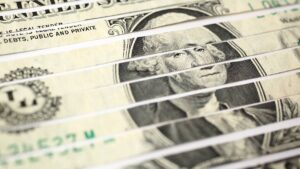Here’s what BetaShares’ CEO thinks about ETF growth in 2019 and what they look for

It has been a solid year for ETFs, which have returned 17.6 per cent in Australia this year.
These offer investors exposure to assets international share markets, commodities or even a domestic portfolio in just one security traded on the ASX.
However, small ASX company shares are an afterthought for most ETFs – only seven on the market are small-company focused.
BetaShares’ CEO Alex Vynokur has built a successful business off the back of ETFs and he spoke with Stockhead about the ETF market.
His firm operates dozens of ETFs and one of them is small company focused – BetaShares Australian Small Company Selected Fund ETF (ASX: SMLL). It listed two years ago and has gained 14 per cent since listing.
Yet, by the company’s own admission companies will be, “generally within the 350 largest companies by market capitalisation”.
Stockhead found some stocks it invested in that were small but few that could be classified as high risk. According to Bloomberg, less than 6 per cent was invested in technology whilst industrials, consumer goods and real estate made up 45 per cent.
Liquidity is most important
Vynokur told Stockhead that one thing people expect from ETFs is liquidity.
“When we build a product we always want to make sure the underlying companies are liquid because the investors themselves expect liquidity,” he said.
“We would consider [more small company investments] provided there was sufficient liquidity in the underlying stocks. That would be the most important thing.”
Alluding specifically to the SMLL ETF he said, “that fund is quite actively screening for liquidity so it is not investing in any companies that will not meet liquidity [tests]”.
“We’re looking to construct portfolios and build it with stocks that meet the liquidity criteria, have positive earnings, strong ability to service debt, [strong] relative valuation metrics and price momentum.”
Stockhead put to him the question of a bubble around unprofitable tech stocks. He responded: “A number of companies might have a significant market cap and have high liquidity. But that does not mean they are an investment worth making so we are looking out for those sort of traps.”
Why has 2019 been a strong year for ETFs?
Why have ETFs performed well? Vynokur said it was due to the underlying assets performing and investors wanting exposure.
“ETFs really provide exposure to a diverse range of markets and major investments,” he said.
“If you look at a range of asset classes, Australian equities have done well but international equities have been strong performers for a while.
“More importantly the underlying companies comprising these indices are performing well.
“I would also say, defensive exposures have generated strong returns. One of our ETFs, [BetaShares Australian Investment Grade Corporate Bond ETF (ASX: CRED)], is investment grade corporate bond ETF and typically investment grade corporate bonds are considered a defensive play.
“Nobody really buys them thinking they’ll receive significant returns. They think about preservation of capital or the negative correlations with equities. But interestingly enough in the last 12 months, CRED has actually returned over 11%.
“The reason why that has returned over 11% when interest rates are low and bond yields have compressed. And bond prices have actually risen. So investors that had an allocation to a defensive exposure have actually done quite well.
“So what’s happened is the growth exposures have delivered good returns and defensive exposures have delivered both returns.”
UNLOCK INSIGHTS
Discover the untold stories of emerging ASX stocks.
Daily news and expert analysis, it's free to subscribe.
By proceeding, you confirm you understand that we handle personal information in accordance with our Privacy Policy.








